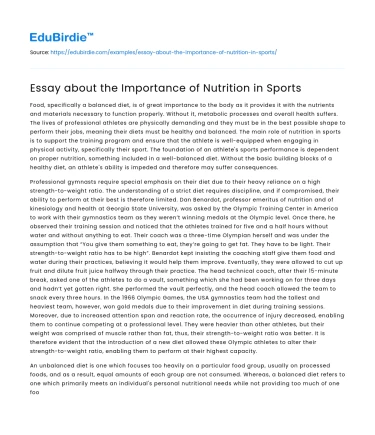Food, specifically a balanced diet, is of great importance to the body as it provides it with the nutrients and materials necessary to function properly. Without it, metabolic processes and overall health suffers. The lives of professional athletes are physically demanding and they must be in the best possible shape to perform their jobs, meaning their diets must be healthy and balanced. The main role of nutrition in sports is to support the training program and ensure that the athlete is well-equipped when engaging in physical activity, specifically their sport. The foundation of an athlete's sports performance is dependent on proper nutrition, something included in a well-balanced diet. Without the basic building blocks of a healthy diet, an athlete's ability is impeded and therefore may suffer consequences.
Professional gymnasts require special emphasis on their diet due to their heavy reliance on a high strength-to-weight ratio. The understanding of a strict diet requires discipline, and if compromised, their ability to perform at their best is therefore limited. Dan Benardot, professor emeritus of nutrition and of kinesiology and health at Georgia State University, was asked by the Olympic Training Center in America to work with their gymnastics team as they weren’t winning medals at the Olympic level. Once there, he observed their training session and noticed that the athletes trained for five and a half hours without water and without anything to eat. Their coach was a three-time Olympian herself and was under the assumption that “You give them something to eat, they’re going to get fat. They have to be light. Their strength-to-weight ratio has to be high”. Benardot kept insisting the coaching staff give them food and water during their practices, believing it would help them improve. Eventually, they were allowed to cut up fruit and dilute fruit juice halfway through their practice. The head technical coach, after their 15-minute break, asked one of the athletes to do a vault, something which she had been working on for three days and hadn’t yet gotten right. She performed the vault perfectly, and the head coach allowed the team to snack every three hours. In the 1966 Olympic Games, the USA gymnastics team had the tallest and heaviest team, however, won gold medals due to their improvement in diet during training sessions. Moreover, due to increased attention span and reaction rate, the occurrence of injury decreased, enabling them to continue competing at a professional level. They were heavier than other athletes, but their weight was comprised of muscle rather than fat, thus, their strength-to-weight ratio was better. It is therefore evident that the introduction of a new diet allowed these Olympic athletes to alter their strength-to-weight ratio, enabling them to perform at their highest capacity.
An unbalanced diet is one which focuses too heavily on a particular food group, usually on processed foods, and as a result, equal amounts of each group are not consumed. Whereas, a balanced diet refers to one which primarily meets an individual's personal nutritional needs while not providing too much of one food group or nutrient. For NFL players specifically, they need to maintain a strong, lean physique to perform their job on the field. Tom Brady, one of the most successful NFL quarterbacks, winning six of nine Super Bowls, attributes his great success and longevity in the sport to his strict anti-inflammatory diet. A great focus is placed on his choice of diet as it allows him to properly recover and continue to perform at his best on the field, he says, “If I know my body will experience inflammation every Sunday during the season, the last thing I want to do is stack on more inflammation on top of it - not if I want to feel great every time I take the field”. His personal chef, Allen Campbell, only cooks with the freshest organic vegetables and prepares food focused around whole grains, such as brown rice or quinoa, and lean meats, including chicken or grass-fed steak. However, a wide range of nutrition professionals have also opposed the idea that Tom Brady’s continued NFL success is not only due to his strict clean diet but rather his luck on the field. A recent analysis in the Washington Post found that he gets hit at about half the average rate NFL quarterbacks endure, therefore indicating that the occurrence of injury and risk of contact is far less than a usual professional quarterback. This, therefore, indicates the role that a balanced diet plays in such a physically demanding environment where fast recovery and peak performance are required.
However, it can be argued that the importance of diet is declining due to the continual introduction of performance supplements and electrolyte drinks, which have the ability to speed up recovery time and even impact the way in which certain nutrients are absorbed into the body. A survey of masters athletes revealed 60% used nutritional supplementation at the World Masters Athletics Indoor Championships in 2004 according to Missouri Medicine, thus indicating supplement use is on the incline as they can be used to gain an edge over the competition. Furthermore, the use of electrolyte drinks by professional athletes has taken precedence over water as a source of hydration because it also provides carbohydrates, the body’s preferred form of fuel. Research has found that a sports drink made up of 4-8% carbohydrates is absorbed most easily by the small intestine and is, therefore, a good choice of fluid during and after exercise.
To conclude, it is evident that a healthy balanced diet is of great importance to professional athletes as it provides them with the necessary nutrients to perform at their highest capacity. Through the investigation of a variety of sports, the ability of an athlete is largely dependent on their varied diets and the way in which they focus on individual nutritional needs.






 Stuck on your essay?
Stuck on your essay?

